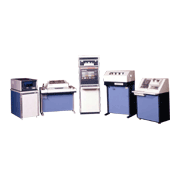The OKITAC-4500 was fully equipped with the online real-time capabilities and input/output control capabilities necessary for scientific and engineering calculation and measurement, and for process control. It was completed and marketed in 1970 as an enhanced version of the OKITAC-4300. The OKITAC-4500 design was unsatisfactory from the standpoint of performance. Price rose due to excessive focus on general applicability, and there were limitations on function which made the system inconvenient to use. Therefore, applications were limited to tasks such as scientific and engineering calculation, process control, instrument control and circuit control, and in these fields, the machine was developed as a computer having the same performance as a large computer. The memory unit could cope with a wide range of temperatures (-25°C-75°c); memory capacity was 8K words (1 word = 16 bits) -65K words; interrupts ranged from 8 to 24 levels; the OS was DOS (Disk Operating System); and assembler, FORTRAN and COBOL were used as the programming language.
Furthermore, the OKITAC-4500C, which achieved higher speed using TTL-ICs (integrated circuit elements), was announced in 1973, and that machine was active in facilities such as the research laboratories of universities and government organizations.
OKITAC-4500 Model Specifications
| |
OKITAC-4500 |
OKITAC-4500C |
| Announcement date |
April 1970 |
1973 |
| CPU |
8bit independently developed CPU |
| Memory element |
Magnetic core |
| Main memory capacity |
8K-65Kword (1 word = 16 bits) |
| Cycle time |
1.5µs |
600ns |
| Instructions |
1-word-1-instruction, 2-words-1-instruction |
| Address systems |
11/2 system, page system, absolute address system, relative address system, indirect address system |
| Number of instructions |
83 (Excluding input/output instructions) |
| Arithmetic speed |
| |
Fixed point |
Floating point |
Addition/
Subtraction |
3.0µs |
35.5µs |
| Multiplication |
13.5µs |
39.1µs |
| Division |
14.5µs |
50.1µs |
|
| |
Fixed point |
Floating point |
Addition/
Subtraction |
1.4µs |
3.78S |
| Multiplication |
6.16µs |
10.22µs |
| Division |
7.0µs |
10.78µs |
|
| Interrupt levels |
Basic 8 levels, 24 levels optiona |
Basic 16 levels, 24 levels optional |
| Real-time lock |
3 (Optional) |
| Input/Output control |
- Selector channels: 2
- Multiplexer channels: 1
- External connection channels: 1 (Free)
|



